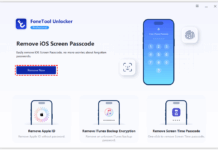The travel industry was in a recent crisis due to COVID-19 restrictions, but you can be sure it’s recovering. Now, in the globalized world, people are eager for new experiences and will be happily traveling across the world. And you may help them with it!
You can check one of the travel app development services to see how to develop such an app. Now, let’s check industry numbers and understand how you can be into it.
Travel industry: Is it worth it?
Before we dive in, it would be better to explore the context. The travel industry is extremely large: if combining all numbers from air tickets, bookings, tours, and local tourist spending in all countries, it will give a tremendous 3.6 trillion in 2019, as you can see below. And for 2023, it is $5.81 trillion, so the growth is high, too!

What about business apps’ revenues? There are $1.2 billion in total nowadays, and you can see that even the 2020 COVID-related recession just slightly stopped the growth process, damaging mostly the booking apps.

There is plenty of free space here. So, let’s learn how these apps work, are developed, and understand how you can make a profit here!
How do they work? Essentials
Travel apps solve various people’s problems, but all of them are connected with a single goal: to facilitate movement from one point to another and realize people’s desires there.
All of them are connected with some elements of the journey. The most important of them are traveling, accommodation, and orienting in locations. Ticket booking, accommodation reserving, and local transportation are app services that help with these problems. In addition, a traveler needs help orienting to the new location, exchanging the currency, understanding the local language, and learning about local culture and places. On each point, there can be an app that will help.
See a Skyscanner design below as an example of an air trip booking app.

Travel app types and examples
Based on the essentials, which types can be useful?
- Flight booking apps compare prices on airline tickets, such as Skyscanner. However, it can include also train and bus tickets or even provide an option to move with someone in a car for a fare (carpooling), such as BlaBlaCar.
- Hotel booking and reservation: they can help your customer find a place to live. It, however, should not be concentrated on hotels or hostels alone: providing information about homeowners open to tourist accommodation is also a good idea. Examples are well-known Booking.com and Airbnb, and HostelWorld is robust for finding a cheap hostel.
- Transportation and orientation apps show the locality and how it is best to move from one point to another. The basic app with such functionality is well-known Google Maps, but there are much more examples of them focused on travel specifically. TripAdvisor is a good case of such an app, and you can see its interface in the screenshots below.
- Currency exchange apps can provide direct financial services or connect with trustworthy organizations or people where customers can exchange money. Remember that if you’d like to develop an app of the first type, you need to provide a robust security system for payments! An example is XE Currency.
- Translation apps are essential if your customer moves abroad, and a simple Google Translate can help here. Language learning, such as Duolingo, can also be added to this category.
- Travel guides provide interactive information about the location. An example is PackPoint which shows what you must bring with you for traveling to a specific place.
You can combine some features in a single travel app. Each type has its own niche, and it would be wise to research them according to your interests and their profitability. Let’s summarize now which features will be necessary for them in general.
Essential features
Which features your app should probably have, no matter which type you choose?
- Registration and user profile is the basic option for almost any tapps of such type, as all of them provide information that your user would like to save.
- Lists and searches are crucial to ensure that your user interface will be friendly and easy to perceive.
- Filters are essential, too, to enable your customer to choose what they want. As with searches, no matter it is a booking or transportation app: clearly defined and tested filters should be present there.
- Chatting options will be necessary for most types of travel apps, as your customers will communicate with the service they want or each other.
- Booking options: similarly, in most types, your customers will reserve something, will it be a ticket, accommodation, tour, or local attraction. See the interface of Booking.com below: it combines maps, filters, and booking features together, obtaining an efficient UI/UX design that is appraised by scientific research.
- Feedback and notification are must-have elements, as they enable your customers to connect with you and suggest improvements. Notifications, which should be customizable, will signalize them that they need to do something.

Development process
Actually, all apps have similar development processes: the difference is that you must determine the app’s goals, functionality, and design. For the travel app, you must determine all basic features and clearly identify the app’s type and the range of problems it will solve.
Let’s see the development algorithm:
- Define goals: it is the part where you define your app’s type, overall design, the problem it will solve, and the mission it will carry.
- Conduct market research: you should be familiar with competitors’ and customers’ preferences in the travel sector where your app will operate.
- Design the prototype and develop an MVP (minimum viable product) with limited features, which will enable you to test how relevant and profitable your app will be. It will cost you only $30,000 at most to develop a decent MVP.
- Develop a code for your application to realize all its features.
- Test its functionality with customers, collect, and analyze the feedback
- Release your app and establish the maintenance with updates.
Monetization strategies
How to earn money on your mobile travel app? In this industry, options are almost limitless. Here are several of them.
- Advertising is a basic option, as there will be plenty of possibilities to promote various services connected with travel. Be sure that the ad won’t be annoying!
- Commissions from the hotels, airline companies, attractions, and other places which you’ll promote are another popular and viable option.
- Services for travel agencies include helping them attract travelers for tour planning, for which you’ll obtain payments.
- Subscriptions in case your app can provide a robust and unique product, which will be worth paying for your customers.
- Premium features, similarly, can be attractive for your customers to buy. They can include, for example, the ability to find the cheapest hostel in the area, if you’ll be able to provide such a feature.
There are only basic monetization strategies, and many more are available if you’ll search for them. Here are quick examples: help customers create their own travel content for a commission, sell travel gear as an affiliate marketer, or even connect with local festivals to attract people to them for a reward!
There are many opportunities, and you should certainly check the travel industry to find them.
Recommendations
Here is the article’s summary of the two short recommendations.
- Develop basic features essential for all travel apps, and use them as a basis. It will ensure that your app will be user-friendly and realize its functions, no matter which type you’ll choose.
- Explore the travel industry, which is large and has many sides: from airplanes and luxury hotels to hostels with $4/night and local festivals. You’ll find endless opportunities to monetize your app and find your own profitable niche.
Conclusion
The travel industry is a robust and, as recent events showed, crisis-proof one. Travel apps solve the problems of the industry, and you certainly can enter it. For a successful entry, explore and understand this vibrant industry and select the appropriate niche. As you see, there are endless opportunities to combine various niches and monetization strategies. The development of the app’s basic features is essential to ensure that your customers will be happy.
Travel app development services and strategies
The travel industry was in a recent crisis due to COVID-19 restrictions, but you can be sure it’s recovering. Now, in the globalized world, people are eager for new experiences and will be happily traveling across the world. And you may help them with it!
You can check one of the travel app development services to see how to develop such an app. Now, let’s check industry numbers and understand how you can be into it.
Travel industry: Is it worth it?
Before we dive in, it would be better to explore the context. The travel industry is extremely large: if combining all numbers from air tickets, bookings, tours, and local tourist spending in all countries, it will give a tremendous 3.6 trillion in 2019, as you can see below. And for 2023, it is $5.81 trillion, so the growth is high, too!
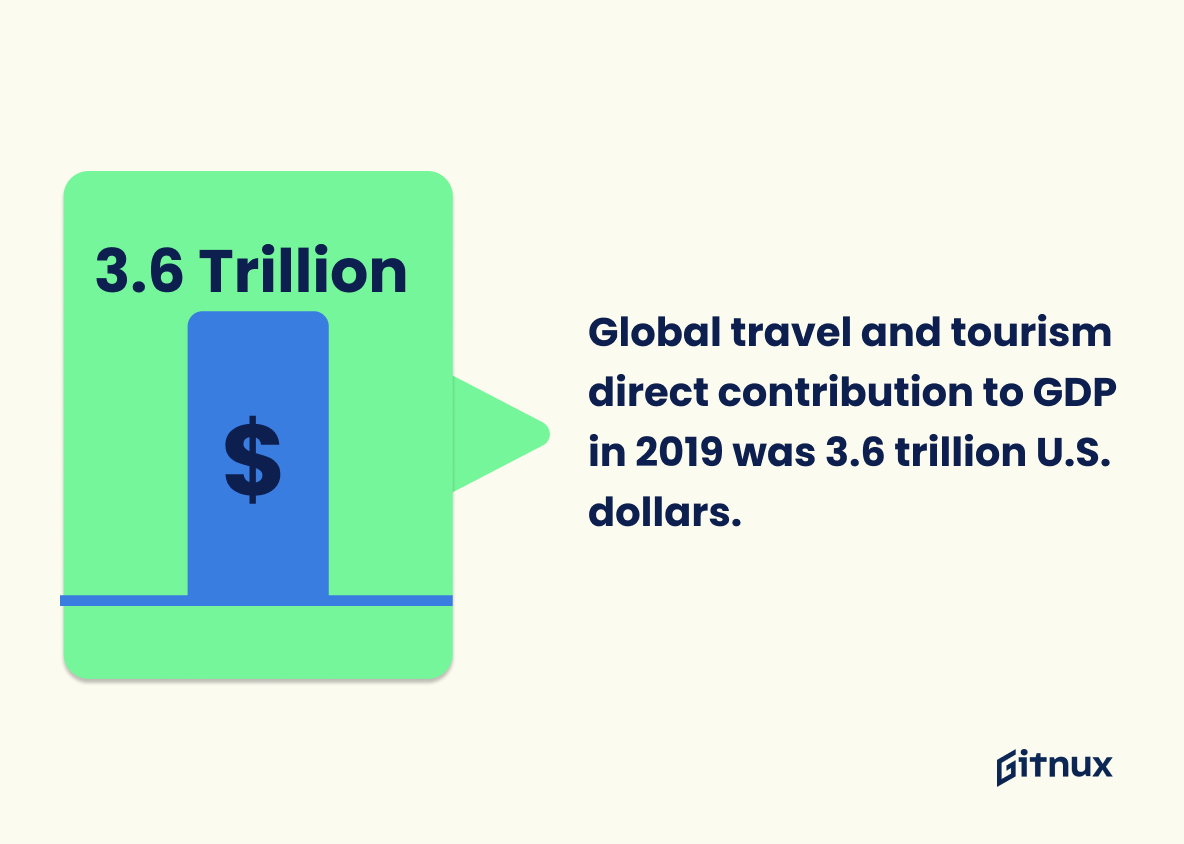
What about business apps’ revenues? There are $1.2 billion in total nowadays, and you can see that even the 2020 COVID-related recession just slightly stopped the growth process, damaging mostly the booking apps.
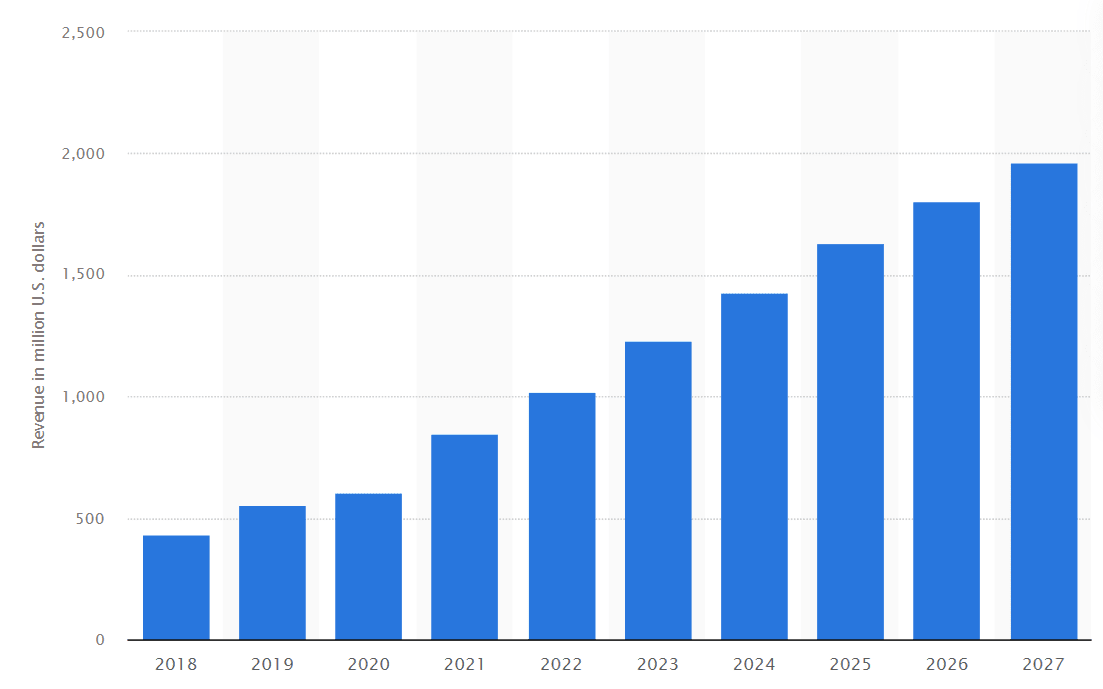
There is plenty of free space here. So, let’s learn how these apps work, are developed, and understand how you can make a profit here!
How do they work? Essentials
Travel apps solve various people’s problems, but all of them are connected with a single goal: to facilitate movement from one point to another and realize people’s desires there.
All of them are connected with some elements of the journey. The most important of them are traveling, accommodation, and orienting in locations. Ticket booking, accommodation reserving, and local transportation are app services that help with these problems. In addition, a traveler needs help orienting to the new location, exchanging the currency, understanding the local language, and learning about local culture and places. On each point, there can be an app that will help.
See a Skyscanner design below as an example of an air trip booking app.
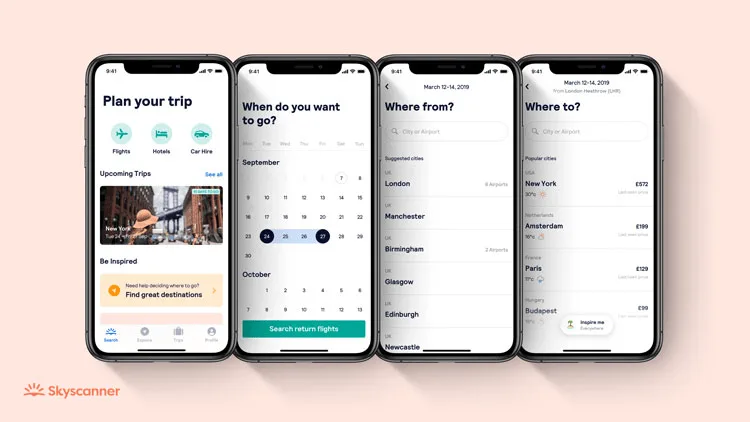
Travel app types and examples
Based on the essentials, which types can be useful?
- Flight booking apps compare prices on airline tickets, such as Skyscanner. However, it can include also train and bus tickets or even provide an option to move with someone in a car for a fare (carpooling), such as BlaBlaCar.
- Hotel booking and reservation: they can help your customer find a place to live. It, however, should not be concentrated on hotels or hostels alone: providing information about homeowners open to tourist accommodation is also a good idea. Examples are well-known Booking.com and Airbnb, and HostelWorld is robust for finding a cheap hostel.
- Transportation and orientation apps show the locality and how it is best to move from one point to another. The basic app with such functionality is well-known Google Maps, but there are much more examples of them focused on travel specifically. TripAdvisor is a good case of such an app, and you can see its interface in the screenshots below.
- Currency exchange apps can provide direct financial services or connect with trustworthy organizations or people where customers can exchange money. Remember that if you’d like to develop an app of the first type, you need to provide a robust security system for payments! An example is XE Currency.
- Translation apps are essential if your customer moves abroad, and a simple Google Translate can help here. Language learning, such as Duolingo, can also be added to this category.
- Travel guides provide interactive information about the location. An example is PackPoint which shows what you must bring with you for traveling to a specific place.
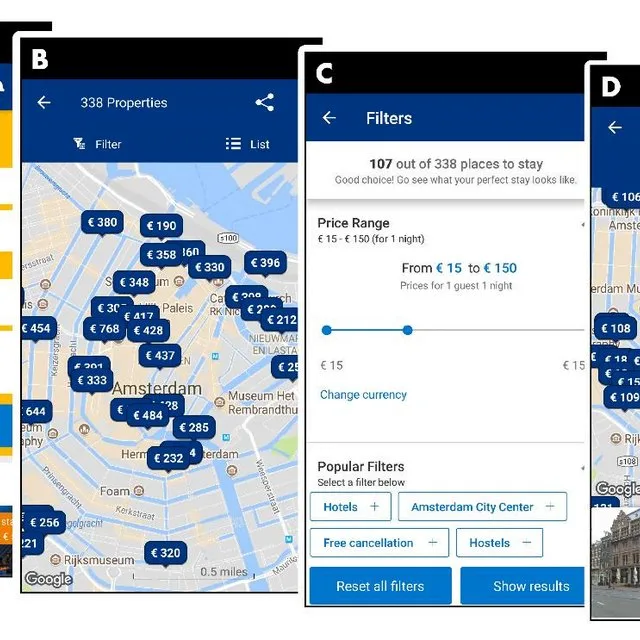
You can combine some features in a single travel app. Each type has its own niche, and it would be wise to research them according to your interests and their profitability. Let’s summarize now which features will be necessary for them in general.
Essential features
Which features your app should probably have, no matter which type you choose?
- Registration and user profile is the basic option for almost any tapps of such type, as all of them provide information that your user would like to save.
- Lists and searches are crucial to ensure that your user interface will be friendly and easy to perceive.
- Filters are essential, too, to enable your customer to choose what they want. As with searches, no matter it is a booking or transportation app: clearly defined and tested filters should be present there.
- Chatting options will be necessary for most types of travel apps, as your customers will communicate with the service they want or each other.
- Booking options: similarly, in most types, your customers will reserve something, will it be a ticket, accommodation, tour, or local attraction. See the interface of Booking.com below: it combines maps, filters, and booking features together, obtaining an efficient UI/UX design that is appraised by scientific research.
- Feedback and notification are must-have elements, as they enable your customers to connect with you and suggest improvements. Notifications, which should be customizable, will signalize them that they need to do something.
Development process
Actually, all apps have similar development processes: the difference is that you must determine the app’s goals, functionality, and design. For the travel app, you must determine all basic features and clearly identify the app’s type and the range of problems it will solve.
Let’s see the development algorithm:
- Define goals: it is the part where you define your app’s type, overall design, the problem it will solve, and the mission it will carry.
- Conduct market research: you should be familiar with competitors’ and customers’ preferences in the travel sector where your app will operate.
- Design the prototype and develop an MVP (minimum viable product) with limited features, which will enable you to test how relevant and profitable your app will be. It will cost you only $30,000 at most to develop a decent MVP.
- Develop a code for your application to realize all its features.
- Test its functionality with customers, collect, and analyze the feedback
- Release your app and establish the maintenance with updates.
Monetization strategies
How to earn money on your mobile travel app? In this industry, options are almost limitless. Here are several of them.
- Advertising is a basic option, as there will be plenty of possibilities to promote various services connected with travel. Be sure that the ad won’t be annoying!
- Commissions from the hotels, airline companies, attractions, and other places which you’ll promote are another popular and viable option.
- Services for travel agencies include helping them attract travelers for tour planning, for which you’ll obtain payments.
- Subscriptions in case your app can provide a robust and unique product, which will be worth paying for your customers.
- Premium features, similarly, can be attractive for your customers to buy. They can include, for example, the ability to find the cheapest hostel in the area, if you’ll be able to provide such a feature.
There are only basic monetization strategies, and many more are available if you’ll search for them. Here are quick examples: help customers create their own travel content for a commission, sell travel gear as an affiliate marketer, or even connect with local festivals to attract people to them for a reward!
There are many opportunities, and you should certainly check the travel industry to find them.
Recommendations
Here is the article’s summary of the two short recommendations.
- Develop basic features essential for all travel apps, and use them as a basis. It will ensure that your app will be user-friendly and realize its functions, no matter which type you’ll choose.
- Explore the travel industry, which is large and has many sides: from airplanes and luxury hotels to hostels with $4/night and local festivals. You’ll find endless opportunities to monetize your app and find your own profitable niche.
Conclusion
The travel industry is a robust and, as recent events showed, crisis-proof one. Travel apps solve the problems of the industry, and you certainly can enter it. For a successful entry, explore and understand this vibrant industry and select the appropriate niche. As you see, there are endless opportunities to combine various niches and monetization strategies. The development of the app’s basic features is essential to ensure that your customers will be happy.

